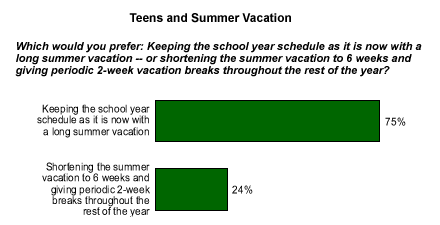Summer is here, and students across the country are giving up their textbooks, pencils, and calculators for leisurely days at the swimming pool, summer jobs, or just more time with their friends and families. A three-month summer vacation seems entrenched in American public education, but has it been the best arrangement for students all these years?
Proponents of year-round education (YRE) -- which promotes a school calendar with shorter, more frequent vacations rather than a long summer vacation -- say no. Year-round education, according to its advocates, minimizes learning loss that occurs over the summer, alleviates overcrowded school conditions, saves schools money, and leads to improved test scores. Opponents of YRE argue that the concept of summer learning loss is overblown, and that year-round schooling costs more and doesn't lead to improved test scores. There is a case to be made either way, but what do American teens themselves think about their summer vacations?
In a recent Gallup Youth Survey*, U.S. teens (aged 13 to 17) were asked: "Which do you prefer: keeping the school year schedule as it is now with a long summer vacation -- or shortening the summer vacation to 6 weeks and giving periodic 2-week vacation breaks throughout the rest of the year?" Seventy-five percent of teens said they prefer to keep schedules as they are (with a long summer vacation), and nearly a quarter (24%) said they prefer a shorter summer vacation with periodic vacation breaks.

Teens are unified, for the most part, in their preferences for long summer vacations. Across gender, class standing, and other groupings, preference for this schedule hovers around 75%. Support for a long summer vacation does not drop below 65% among any of the groups measured. There is a slight difference, however, between the summer vacation preferences of white teens and black teens. Seventy-seven percent of white teens prefer a long summer vacation, and a somewhat smaller percentage of blacks, 67%, share the same preference. Seventy-nine percent of Hispanic teens prefer a long summer vacation.
The fact that three-month summer vacations have been the norm for so many years may be behind teens' preference for them. Many teens may be hesitant to favor changing a schedule that they've observed since kindergarten.
Bottom Line
The popularity of year-round education appears to be rising in the United States. According to the National Association for Year-Round Education, there has been a dramatic increase in the use of this type of schedule in the last 15 years. In 1986, 14 states had public schools that were trying a year-round schedule; by 2002, that number had grown to 46 states. Given that existing state budget woes are stretching school funds thin, perhaps more schools will look to year-round education for possible relief. If year-round education takes off, it will be interesting see if teens' opinions on their summer vacations change accordingly.
*The Gallup Youth Survey is conducted via an Internet methodology provided by Knowledge Networks, using an online research panel that is designed to be representative of the entire U.S. population. The current questionnaire was completed by 1,200 respondents, aged 13 to 17, between Jan. 23-Feb. 10, 2003. For results based on the total sample, one can say with 95% confidence that the maximum margin of sampling error is ±3%. For a complete description of the sampling and weighting procedures used to conduct the survey, click here.